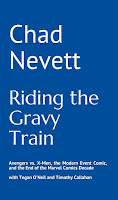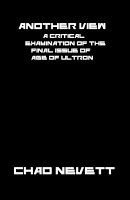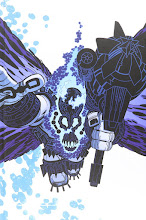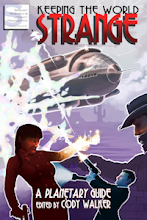If Tim had pitched this topic to me a year ago, I wouldn't have had a lot to say. I'd read, what, Eternals and the first omnibus of Jack Kirby's Fourth World? In this past year, though, I've read the rest of the Fourth World, OMAC, and... okay, I meant to read his Captain America and Black Panther runs (they're on the middle shelf in the bookcase next to my bed!), but I've been busy. I've flipped through them plenty. So, basically, I haven't improved THAT much over the past year, but I don't feel like such a know-nothing loser.
My favourite Kirby '70s work is OMAC. Before reading that, I didn't quite understand why that concept kept coming back despite it failing every single time. Why was it one of the central pieces of Infinite Crisis? Why the new 52 relaunch (even though I really enjoyed it)? It's because Kirby crafted a genuinely amazing unfinished masterpiece. It ends mid-story after eight issues of all-out insanity. It was actually startling for me to read it, knowing Kirby more as the artist who worked with Stan Lee. Try going from early Avengers issues to OMAC. Jesus...
But, the big split comes down to Fourth World/Eternals. They're not the same concept by any stretch of the imagination, but they're related. They're clearly coming from a similar place inside. Kirby's love and interest in myth and legend -- in how these larger, god-like beings influence the world and, much of the time, deal with conflicts not unlike ours. What amazes me is that, after his experience at DC with the New Gods stuff, that he would try something... similar doesn't seem right... related(?) with Marvel. It's a scaled back attempt, of course. The Fourth World story happened over the course of four comics, including a Superman one, while Eternals was just one comic and originally meant to be separate from the Marvel Universe. And every attempt by Marvel to get Kirby to bring it into the Marvel Universe was rebuffed in some way -- like the Hulk turning out to be a robot. Reading the first issue of Eternals, it's something very different from what he did with the New Gods. Those characters were gods like Thor and the Asgardians -- big fights, bright costumes. Eternals had those, too, but not really in that first issue. It was centred around an archaelogical dig. It was people in regular clothes coming into contact with god-like beings that would determine the fate of the world.
New Gods shared that idea most out of the Fourth World books as Orion gets his own little gang of humans to help him out (for a while, at least). That intersection between myth and humanity is something Kirby was keen on. Earth was the battlefield of the New Genesis/Apokolips war... it was the petri dish of the Celestials... and, in both cases, humans were caught in the middle. But, some got to participate. It could be criminals like Intergang or regular citizens like the people Orion rescues and, then, befriends. There was an agency that Kirby gave to humans that were aware of the conflicts happening around (and above) them. It's a little cheesy at times, but, sometimes, it elevates humanity to level of these gods, these mythic figures. "The Death Wish of Terrible Turpin" is the best example of a human inserting himself into this conflict, unwilling to let these giant forces simply wreck his world. He may stand beside Orion by default, but there's a sense of outrage, of Turpin demanding both sides leave the planet. Threads like these are never the main point of Kirby's work during this time, but they keep coming up in small ways. He was in love with the idea of these mythic stories, of gods and demons, but he also recognised what their impact could be on humanity.
A few weeks ago, I finished the last Fourth World omnibus and couldn't get over how The Hunger Dogs didn't read like anything I had seen by Kirby before. It was so fragmented and poetic. So filled with bombast and, yet, moments of quiet... I know, I know, it's not from the '70s, so I'm cheating. I don't know... it's a sad book.
In 30 minutes, Tim Callahan's post will go up and will be much better than this. Also, my #10 comic of 2012 post will go up at Comics Should be Good.
[Don't forget to donate what you can to the Hero Initiative (Details in this post)! After you do, let me know via comment or e-mail (found at the righthand side) so I can keep track of donations -- and who to thank.]
skip to main |
skip to sidebar
"Chad Nevett is the spicy mustard of comics reviews" -- Adam Langton, Lovable Fucker and Chad Nevett's Best Man
About
GraphiContent was a blog featuring comic criticism, commentary, analysis, theory and discussion. Oh, and the odd rant, review or totally random post.
Chad Nevett has a BA in English and political science, and an MA in English Language & Literature--Creative Writing. He was a reviewer for Comic Book Resources, blogger for Comics Should be Good, and writer for 411mania. He resides in Windsor, Ontario with his wife and her cat. He can be reached at chevett13[at]yahoo[dot]ca.
Notable Posts (In Chronological Order)
- The Future is X-Rated: Marvel Boy, the Modern World, and the History of the Marvel Universe
- A Music Video on Paper: The Final Chapter of Codeflesh
- Tony Stark, Futurist
- "All you need is fuck."
- Man v. Superman
- Civil War v. Infinite Crisis
- Building a Better Batman: Grant Morrison's First Year on Batman
- U.S. v. T.H.E.M. with Little Ol' Me Stuck in the Middle
- Mark Millar's Ultimate X-Men
- Building a Better Batreader: Grant Morrison's Second Year on Batman
- Secret Invasion Reading Order (Updated June 29, 2013)
- Top 25 Warren Ellis Comics (Oct. 2009)
- Building a Better Batfamily: Grant Morrison's Third Year on Batman (and Robin)
- You Don't Just Want to Break Me, You Want to Tear Me Apart
- 50 Things I Learned in My Three Years and Four Months as a Reviewer for Comic Book Resources
- Avengers vs. X-Men Reading Order (Updated August 17, 2013)
Notable Collections of Posts (In Semi-Chronological Order)
- Joe Casey Comics Archive
- Countdown to Who Cares?
- The Chad and Steve Q&A Series
- I've Got 52 Problems, but a Bitch ain't One
- Best of 2007
- Hello Cosmic: The Works of Jim Starlin Archive
- Chad's Jackass Comic Creator Interviews from 2001
- The Superman 2000 Pitch (with Tim Callahan)
- Raymond Chandler's "Twelve Notes on the Mystery Story"
- Best of 2008
- Blogathon 2009: Brian Michael Bendis's Avengers
- Best of 2009
- Art Discussion Month 2010
- Five Years Blogging: A Life Well Wasted (with David Brothers)
- Booze, Broads & Bullets: Sin City
- Blogathon 2010: Hellblazer (and Hellblazer Posts Beyond the Blogathon)
- Best of 2010
- 28
- Blogathon 2011: Superhero Comics of the Past Decade
- Best of 2011
- Riding the Gravy Train (Avengers vs. X-Men) Archive
- Blogathon 2013: Comics Critics All-Stars
- Best of 2012
Links
Blogs Worth Reading
-
-
Charts – 26 April 202412 hours ago
-
-
SILENCE! #3154 days ago
-
-
-
The Last Thorsday2 months ago
-
Everybody’s Rockin’6 months ago
-
-
Social (Science) Fiction8 months ago
-
The Rest of the Cruise1 year ago
-
-
-
-
Untitled 1:5 years ago
-
Farewell, sweet prince6 years ago
-
Hello World6 years ago
-
-
-
That’s a wrap.9 years ago
-
episode 026: exit the world10 years ago
-
-
Books Read in 201211 years ago
-
Building Stories - Suggested Reading Order11 years ago
-
Final Crisis #715 years ago
-
Riding the Gravy Train: Avengers vs. X-Men, the Modern Event Comic, and the End of the Marvel Comic
Another View: A Critical Reading of the Final Issue of Age of Ultron
GØDLAND CELESTIAL EDITION THREE
Shot in the Face: A Savage Journey to the Heart of Transmetropolitan
Keeping the World Strange: A Planetary Guide
Minutes to Midnight: Twelve Essays on Watchmen
Writing Without Direction: 10 1/2 Short Stories by Canadian Authors under 30
Blog Archive
-
▼
2013
(58)
-
▼
January
(58)
- –30–
- Best of 2012: The Top Ten Comics of 2012
- Best of 2012: Pre-2012 Comics
- Blogathon 2013 Archive Post
- Blogathon 49: End It
- Blogathon 48: 2012 - The Year Everything Ended
- Blogathon 47: Whether Comics Critics Should Turn P...
- Blogathon 46: Joe Casey Youngblood Rewrite (Part 2)
- Blogathon 45: Joe Casey Youngblood Rewrite (Tim Ca...
- Blogathon 44: Joe Casey Youngblood Rewrite (Part 1)
- Blogathon 43: Different Formats
- Blogathon 42: Whether Comics Critics Should Turn Pro
- Blogathon 41: Recommending Comics to Others
- Blogathon 40: Spaceman (Part 2)
- Blogathon 39: Spaceman (Adam Langton Guest Post)
- Blogathon 38: Spaceman (Part 1)
- Blogathon 37: Identity Crisis (Part 2)
- Blogathon 36: Identity Crisis (Shawn Starr Guest P...
- Blogathon 35: Identity Crisis (Part 1)
- Blogathon 34: Monthly Quality (Part 2)
- Blogathon 33: Monthly Quality (Ryan K. Lindsay Gue...
- Blogathon 32: Monthly Quality (Part 1)
- Blogathon 31: Uncanny X-Force (Part 2)
- Blogathon 30: Uncanny X-Force (Kaitlin Tremblay Gu...
- Blogathon 29: Uncanny X-Force (Part 1)
- Blogathon 28: Cyclops was Right! Cyclops was Wrong...
- Blogathon 27: Cyclops was Right! Cyclops was Wrong...
- Blogathon 26: Cyclops was Right! Cyclops was Wrong...
- Blogathon 25: Garth Ennis's Best Female Characters...
- Blogathon 24: Garth Ennis's Best Female Characters...
- Blogathon 23: Garth Ennis's Best Female Characters...
- Blogathon 22: 100 Issues in a Row (Part 2)
- Blogathon 21: 100 Issues in a Row (Augie de Blieck...
- Blogathon 20: 100 Issues in a Row (Part 1)
- Blogathon 19: Best Time to Stop Reading Superhero ...
- Blogathon 18: Best Time to Stop Reading Superhero ...
- Blogathon 17: Best Time to Stop Reading Superhero ...
- Blogathon 16: Dreadstar #1-12 (Part 2)
- Blogathon 15: Dreadstar #1-12 (Jeff Lester Guest p...
- Blogathon 14: Dreadstar #1-12 (Part 1)
- Blogathon 13: Favourite Peter David Star Trek Nove...
- Blogathon 12: Favourite Peter David Star Trek Nove...
- Blogathon 11: Favourite Peter David Star Trek Nove...
- Blogathon 10: West Coast Blues by Jacques Tardi (P...
- Blogathon 09: West Coast Blues by Jacques Tardi (A...
- Blogathon 08: West Coast Blues by Jacques Tardi (P...
- Blogathon 07: Keeping Up With the Critics (Part 2)
- Blogathon 06: Keeping Up With the Critics (David B...
- Blogathon 05: Keeping Up With the Critics (Part 1)
- Blogathon 04: Jack Kirby's Comics Work in the '70s...
- Blogathon 03: Jack Kirby's Comics Work in the '70s...
- Blogathon 02: Jack Kirby's Comics Work in the '70s...
- Blogathon 01: One More Time...
- EXCLUSIVE! Chad Nevett's Comic Book Mini-Reviews a...
- Blogathon 2013 is Five Days Away
- The Splash Page Podcast 2013 Special
- Blogathon 2013
- Direct Message 07: Amazing Spider-Man #700
-
▼
January
(58)






